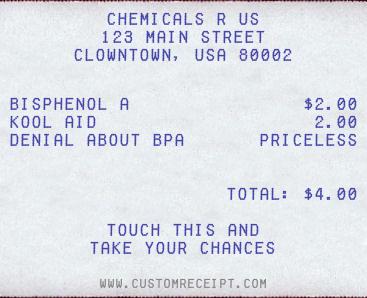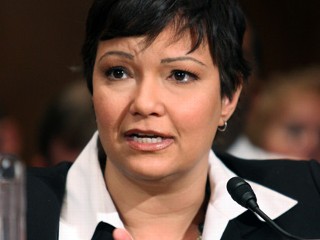David Pakman of Midweek Politics Interviews Wendell Potter
Submitted by Anne Landman on

Submitted by Anne Landman on
Submitted by Anne Landman on
 The Environmental Working Group (EWG) performed laboratory tests on cash register receipts from major U.S. businesses and found bisphenol A (BPA) present on 40% of them, some at levels higher than those found in canned foods, baby bottles and infant formula.
The Environmental Working Group (EWG) performed laboratory tests on cash register receipts from major U.S. businesses and found bisphenol A (BPA) present on 40% of them, some at levels higher than those found in canned foods, baby bottles and infant formula.
The nation's biggest insurers -- not happy with provisions of the four-month-old health care reform law that would force many of them to spend more of the money they collect in premiums for their policyholders' medical care -- are pressuring regulators to disregard what members of Congress intended when they wrote the law, so that they can keep raking in huge profits for their Wall Street owners. If they are successful, many policyholders will soon be shelling out even more than they do today to enrich insurance company shareholders and CEOs. Billions of dollars are at stake, which is why the insurers and their symbiotic allies are pulling out all the stops to gut a key part of the law that would require them to spend at least 80 cents of every premium dollar they take in for medical care.
 The great environmental activist Derrick Jensen, in an article titled "Beyond Hope," published in the May/June 2006 issue of Orion Magazine, lamented,
The great environmental activist Derrick Jensen, in an article titled "Beyond Hope," published in the May/June 2006 issue of Orion Magazine, lamented,
Submitted by Anne Landman on
 The Environmental Working Group (EWG) publishes a popular consumer guide called
The Environmental Working Group (EWG) publishes a popular consumer guide called
Submitted by Steve Horn on
 Reporter Miriam Wang of the ProPublica blog points out that although seafood from the Gulf has been tested for oil content, testers at the Food and Drug Administration (FDA) neglected to test whether the chemical dispersant applied to the oil in the Gulf could be found in the seafood.
Reporter Miriam Wang of the ProPublica blog points out that although seafood from the Gulf has been tested for oil content, testers at the Food and Drug Administration (FDA) neglected to test whether the chemical dispersant applied to the oil in the Gulf could be found in the seafood.
 U.S. Environmental Protection Agency Administrator Lisa Jackson questions BP's widespread application of oil dispersants in the Gulf of Mexico, as does everyone else. According to Jackson, the government is "uncharted waters" with the use of dispersants in the Gulf of Mexico. "The amount of dispersant being used at the surface is unprecedented," Jackson says. BP is also applying the chemicals in the sub-sea environment. In addition, dispersant is stopping oil from collecting on water surface, where it can be more easily controlled.
U.S. Environmental Protection Agency Administrator Lisa Jackson questions BP's widespread application of oil dispersants in the Gulf of Mexico, as does everyone else. According to Jackson, the government is "uncharted waters" with the use of dispersants in the Gulf of Mexico. "The amount of dispersant being used at the surface is unprecedented," Jackson says. BP is also applying the chemicals in the sub-sea environment. In addition, dispersant is stopping oil from collecting on water surface, where it can be more easily controlled.
BP's Web site gives the impression that dispersants "clean and control" ocean oil spills by putting the oil in a state where "it becomes a feast for the naturally-occurring microbes that inhabit the ocean." But dispersants do not clean the water, nor do they remove oil at all, but rather re-arrange where it exists, and change where it goes.
Submitted by Anne Landman on
 Those roly-poly sneakers you are seeing everywhere -- with rounded soles like a rocking chair -- are marketed by manufacturers like Skechers, Reebok, Avia and New Balance with claims that they promote healthy weight loss, improve posture, fight cellulite, reduce knee joint stress and improve the shape of wearers' thighs and buttocks.
Those roly-poly sneakers you are seeing everywhere -- with rounded soles like a rocking chair -- are marketed by manufacturers like Skechers, Reebok, Avia and New Balance with claims that they promote healthy weight loss, improve posture, fight cellulite, reduce knee joint stress and improve the shape of wearers' thighs and buttocks.
President Obama is calling a big part of the health care reform bill he signed into law last March a "Patients' Bill of Rights", suggesting that many of the consumer protections contained in the new law were the same ones the health insurance industry succeeded in killing time and again over many years through a fear-mongering campaign it secretly financed.
 Obama is right -- but only to a point. An important right was missing from his list of consumer protections because, once again, insurers had made sure it would not be part of any bill that reached his desk.
Obama is right -- but only to a point. An important right was missing from his list of consumer protections because, once again, insurers had made sure it would not be part of any bill that reached his desk.
The insurance industry defeated many attempts to pass a Patients' Bill of Rights in the 1990s and 2000s, despite considerable bipartisan support in both the House and Senate. It did this by funneling millions of dollars through a big PR firm it hired to set up a front group -- the Health Benefits Coalition -- whose sole purpose was to scare people away from the legislation. The industry also had one especially important ally: Obama's predecessor in the White House, George W. Bush. Bush threatened to veto any Patients' Bill of Rights that he (read: the insurance industry and its business allies) didn't like. Lawmakers were never able to agree on a single bill that Senators and House members could agree to (the House approved a weakened version of the bill Bush presumably would sign but the Senate refused to weaken its bill), so they eventually just gave up.
Submitted by Anne Landman on
 A Massachusetts judge has given the go-ahead to a new kind of tobacco class-action lawsuit being brought against Philip Morris, maker of Marlboro cigarettes.
A Massachusetts judge has given the go-ahead to a new kind of tobacco class-action lawsuit being brought against Philip Morris, maker of Marlboro cigarettes.
Center for Media and Democracy (CMD)
520 University Ave, Ste 305 • Madison, WI 53703 • (608) 260-9713
CMD is a 501(c)(3) tax-exempt non-profit.
© 1993-2025